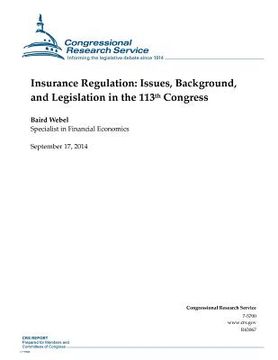Insurance Regulation: Issues, Background, and Legislation in the 113th Congress (in English)
Synopsis "Insurance Regulation: Issues, Background, and Legislation in the 113th Congress (in English)"
The individual states have been the primary regulators of insurance since 1868. Following the 1945 McCarran-Ferguson Act, this system has operated with the explicit blessing of Congress, but has also been subject to periodic scrutiny and suggestions that the time may have come for Congress to reclaim the regulatory authority that it granted to the states. In the late 1980s and early 1990s, congressional scrutiny was largely driven by the increasing complexities of the insurance business and concern over whether the states were up to the task of ensuring consumer protections, particularly insurer solvency.Immediately prior to the recent financial crisis, congressional attention to insurance regulation focused on the inefficiencies in the state regulatory system. A major catalyst was the aftermath of the Gramm-Leach-Bliley Act of 1999 (GLBA), which overhauled the regulatory structure for banks and securities firms, but left the insurance sector largely untouched. Many larger insurers, and their trade associations, had previously defended state regulation but considered themselves at a competitive disadvantage in the post-GLBA regulatory structure. Some advocated for an optional federal charter similar to that available to banks. Various pieces of insurance regulatory reform legislation were introduced, including bills establishing a broad federal charter for insurance as well as narrower, more targeted bills.The states, particularly working through the National Association of Insurance Commissioners (NAIC), were not idle following congressional attention. They reacted quickly to GLBA requirements that related to insurance agent licensing and have since embarked on a widerranging project to modernize insurance regulation. This has included both regulatory aspects, such as streamlining the process for rate and form filing, and more basic legal aspects, such as the creation of an interstate compact to provide uniformity across states for some life insurance products. Because enactment by the state legislature is necessary before the legal changes suggested by the NAIC can take effect in that state, the process typically does not move rapidly.The recent financial crisis refocused the debate surrounding insurance regulatory reform. Unlike many financial crises in the past, insurers played a large role in this crisis. In particular, the failure of the large insurer American International Group (AIG) spotlighted sources of risk that had gone unrecognized. The need for a systemic risk regulator for the entire financial system was a common thread in many of the post-crisis financial regulatory reform proposals. The Dodd-Frank Wall Street Reform and Consumer Protection Act (P.L. 111-203), enacted following the crisis, gave enhanced systemic risk regulatory authority to the Federal Reserve and to a new Financial Services Oversight Council (FSOC), including some oversight authority over insurers. The Dodd- Frank Act also included measures affecting the states' oversight of surplus lines insurance and reinsurance and the creation of a new Federal Insurance Office (FIO) within the Treasury Department.

